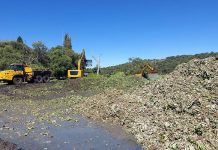Traditionally South Africa’s wine market has been the UK and Europe,” explains Marius Erasmus, manager of Bovlei Winery in Wellington, Western Cape. “At the end of Apartheid and sanctions, many South producers tried to penetrate that market, resulting in the current stiff competition and signs of saturation. “So, while still managing our existing market share in the UK, Belgium and Sweden, we’re now also looking elsewhere for new opportunities.” Bovlei Winery is a medium-sized operation, processing 8 000t of grapes annually to produce 5,5 million litres of wine.
Half the production is bottled – 600 000 cases of wine annually – while the rest is currently sold in bulk. With a long-term cultivar management programme, the aim is to bottle 80% of the total production in the near future, says Marius. “We identified the East as a region with untapped potential, and our first project is currently underway in Thailand,” he says. “This country is renowned for tourism, and especially US dollar tourism. Import tariffs are unfortunately very high at more than 400%, but with the dollar buying power, together with the favourable rand/Thai baht exchange rate, there’s still room for lucrative business.” The South African embassy in Thailand and the Chamber of Commerce helped Bovlei organise a wine tasting there. The objective was to get to know the roleplayers in the Thai wine scene, and to identify possible agents to manage the business on that side.
The right agent
“We had to decide whether we want an expatriate European or a local agent, as both options have positive and negative aspects. Most of the restaurant and hotel chains are owned by Europeans, and the people who will be drinking the wine will most probably be Western tourists. A European agent will most likely understand our business ethics, and there won’t be communication problems. “However, a agent would understand the bureaucratic ethics better, which should make import administration less of a hassle and have better access to locally owned outlets, which could expand our exposure in the Thai market.”
Bovlei decided on a Thai agent, and identified one during their first visit. Negotiations started as they prepared to ship the first container of wine to Thailand. “For us, this was a new experience, as a deal is never completely finalised,” relates Marius. “Right up to the departure date we were still discussing things we thought were agreed upon long ago. But this is part of the culture, and we’re catching up quickly. A lack of bargaining skills is deemed a weakness, so you have to be sharp all the time.” Bovlei will return to Thailand to help the agent once the container has landed. “The agent will organise several tastings in restaurants and will negotiate with hotel groups,” explains Marius. “We expect an initial 4 000 boxes per year, and to grow from there. Wine is packed in units of 12 bottles, as handling fees at the harbour are charged per unit handled, without weight considerations. Boxes of six can be taped together to count as one unit. This is one example of how our Thai agent is valuable to us, with local knowledge and know-how.”
Worldwide reach
“One advantage of trading in Thailand is that the American industry doesn’t compete there, possibly because it is too far, or they perceive the market as too small. We primarily compete with EU wines, against which we have a price advantage in Thailand,” Marius says. Once Thailand is running smoothly, Bovlei will focus on Vietnam. This is also a dollar tourism market, and indications are that opportunities do exist. Bovlei will follow the same procedure as in Thailand – an initial visit to meet the industry roleplayers, wine tastings, then an appointment of a local agent and the export of the first container. Follow-up visits will support the agent until the business is running smoothly.
Bovlei has also made inroads in the US market by signing a contract with the Publix shopping chain. This will give them market access in two states, and future sales from this contract are estimated at 10 000 boxes annually, Marius says. “The US is a very lucrative market, but also extremely difficult to penetrate. This is due to the proximity of Chile and Argentina, and the fact that it is also a wine-producing country,” he says. “It’s crucial to stand out amongst the vast selection of wines already available in the US. We therefore used a consultant, who came up with the Headbutt idea. In South Africa this doesn’t work, but in the US a ‘gimmicky’ approach is sometimes needed to grab attention. “We’re also experimenting with screw caps versus traditional cork. In South Africa consumers associate cork with quality, whereas in the UK, screw caps are rapidly gaining popularity.” Contact Marius Erasmus on (021) 873 1567. |fw








